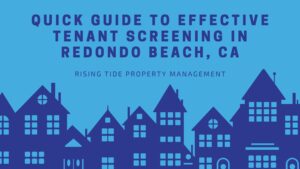Quick Guide to Effective Tenant Screening in Redondo Beach, CA
Property management in Redondo Beach is both a rewarding and challenging experience. As a landlord, your ability to attract and retain quality tenants is critical to maintaining steady rental income and preserving the condition of your property.
However, finding good tenants requires more than just a lease agreement. It requires a thorough tenant screening process that ensures prospective renters are reliable, responsible, and capable of meeting their financial obligations.
Without a proper tenant screening process, landlords may face late rent payments, property damage, and even eviction, leading to costly legal expenses and lost revenue.
By following the steps outlined below, landlords can minimize risks, maximize their rental income, and build positive, long-lasting relationships with tenants.
The Tenant Screening Process
Tenant screening is a multi-step process that allows landlords to assess whether a prospective tenant will be a good fit for their property.
It is not only about checking an applicant’s ability to pay rent, but also about ensuring they have a reliable rental history, a responsible background, and a respectful attitude toward property maintenance.
Below, we break down the essential stages of an effective tenant screening process.
1. Conduct Pre-Screening
Pre-screening is an essential first step in tenant selection, it helps you quickly eliminate candidates who do not meet your basic rental criteria.
Before accepting rental applications, set clear and specific rental requirements that you expect applicants to meet. These can include:
- Income requirements. Typically, a tenant should earn at least three times the monthly rent amount.
- Pet policies. Decide whether pets are allowed, and specify breed restrictions if necessary.
- Credit score minimums. You may want to set a minimum credit score threshold to ensure applicants can manage their finances responsibly.
- Rental history. Specify whether you require tenants to have a certain number of years renting in a similar type of property.
- Background checks. State whether a criminal background check will be required.
Pre-screening involves communicating these expectations clearly in your rental advertisements and asking prospective tenants a few basic questions to ensure they meet these requirements.
This process reduces time spent on applicants who do not meet your needs, helping you focus on qualified tenants who meet your criteria.
2. Review Rental Applications
Once tenants have passed your pre-screening, the next step is to ask them to fill out a detailed rental application. The rental application provides you with crucial information about the prospective tenant’s background and current living situation.
A well-crafted rental application should collect the following information:
- Personal information. Such as full name, current address, and contact details.
- Employment and income details. This includes the employer’s name, job title, length of employment, and salary information.
- Rental history. This includes previous landlords’ names, contact details, and the addresses of previous rental properties.
- References. These should be from employers, personal acquaintances, and prior landlords.
- Emergency contacts. This is extremely important in case of emergencies.
Make sure the application is clear and easy to complete. If an applicant omits key information or provides vague answers, it could be a red flag. Once completed, ensure the application is signed and that the applicant gives permission to conduct credit and background checks.
3. Verify Income and Employment
Verifying the applicant’s income and employment is one of the most critical aspects of the tenant screening process. Tenants need to demonstrate they can afford the rent on an ongoing basis.
To verify income, request supporting documentation such as:
- Pay stubs from the last 2-3 months.
- Tax returns or bank statements for self-employed individuals.
- Employer verification, either through a letter or a phone call to HR.
Confirming employment stability is equally important. A tenant who has been employed for a significant period is generally less likely to miss rent payments.
4. Check References From Previous Landlords
Checking references from previous landlords provides critical insights into how a prospective tenant behaved in past rental situations. It allows you to evaluate their reliability, cleanliness, and respect for property, which can indicate how they will treat your property.
When contacting previous landlords, ask the following key questions:
- Did the tenant pay rent on time?
- Did the tenant take care of the property?
- Did any neighbors or other tenants raise concerns or complaints about the applicant?
- Was the tenant ever late with rent or involved in any disputes?
- Would the landlord rent to this tenant again?
Evaluate Credit and Background Reports
A credit report is one of the most reliable ways to evaluate a tenant’s financial responsibility. It shows their credit score, any outstanding debts, and their history of paying bills on time.
When reviewing the credit report, consider the following:
- Credit score. Typically, a higher credit score suggests that the individual manages their finances responsibly.
- Debt levels. Be cautious if the applicant has excessive debt, as it could affect their ability to pay rent.
- Late payments. Look for patterns of late payments or other financial issues.
Additionally, conduct a background check to look for any criminal history or past evictions.
6. Decide on Acceptance or Denial
If everything aligns with your criteria, you may move forward with offering the lease to the tenant. If you decide to deny an applicant, it’s important to clearly communicate the reason for the denial.
Federal law requires that tenants are informed of why they were not accepted, especially if it was due to information in their credit report or background check. This process helps ensure compliance with fair housing regulations and shows transparency in your decision-making.
Bottom Line
Tenant screening is essential for finding reliable and responsible tenants who will respect your property and meet their financial obligations.
By following these steps—pre-screening, reviewing applications, verifying income, checking references, and evaluating credit and background checks—you can protect your investment and create a positive renting experience for you and your tenants.
At Rising Tide Property Management, we understand the complexities of tenant screening and property management in Redondo Beach.
Our experienced team is here to help you with the entire process, from pre-screening applicants to running credit and background checks, ensuring that you select the right tenants for your property.
Contact Rising Tide Property Management today to learn more about our property management services and how we can assist you in finding the perfect tenants for your Redondo Beach rental property.




